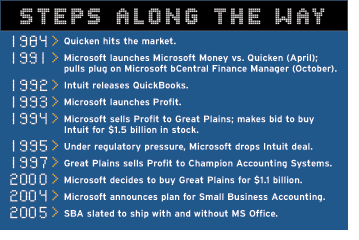Can The Channel Connect For Redmond?
Coastal Computer will continue to integrate with Peachtree and QuickBooks but is also working on another product that will work only with Microsoft Office SBA, Fanelli said.

hen it comes to small-business accounting, Microsoft must be hoping the third time is a charm.
This fall, the company will launch what most people consider its third major attack on a market still dominated by Intuit. And with its new Microsoft Office Small Business Accounting (SBA), to be made available as a stand-alone SKU and, perhaps more importantly, bundled with Office, the company says it got it right this time.
Steve Guggenheimer, Microsoft vice president of worldwide small and midmarket solutions and partners for small business, says the company has done its homework. In addition to the Office ties, part of the company’s integrated innovation push, Microsoft launched a CPA program to recruit this crucial channel.

The segment is crucial because CPAs allied with market leaders Intuit and Best Software’s Peachtree Accounting either resell or recommend accounting products for their clients. Since most CPAs want their customers to use what they themselves run, converting this constituency is critical. Right now, the army of Intuit and Peachtree accountants out there are arguably more important than the accounting technology itself when it comes to customer adoption, many observers say.
The critical CPA channel piece is something Microsoft has not addressed in its previous small-business accounting forays, Guggenheimer told CRN recently.
| AD | |
|---|---|
| id | unit-1659132512259 |
| type | Sponsored post |
Microsoft has had its eye on Intuit and its Quicken-QuickBooks franchise for more than 20 years. Quicken debuted in 1984 and has been wildly successful in the home-office accounting market. QuickBooks, for small businesses, followed in 1992. The next year, Microsoft responded with Microsoft Profit, which was actually developed by then-independent Great Plains Software, Fargo, N.D. Profit fared poorly, and Microsoft sold it to Great Plains in 1984. (Note for trivia buffs: Great Plains then sold Profit to Champion Accounting Systems in 1997, and the trail goes cold from there.) Microsoft’s bCentral hosted small-business accounting offering did little better and was discontinued.
Now Microsoft is back brandishing research claiming that there are 40 million small businesses worldwide (entities with up to 49 employees and fewer than 25 PCs). It sees a huge opportunity here because it estimates that 40 percent of these businesses now use Excel spreadsheets for accounting, while QuickBooks claims a large share of the rest.
Researcher Laurie McCabe, vice president at AMI, agrees with that world view. “Our numbers show about 37 percent of small businesses rely on Excel or even paper and pencil for accounting,” she said. If true, that’s a huge underserved base for an easy-to-use accounting product and also an opportunity for unallied CPA-type partners to reap benefits. AMI defines small businesses as those with up to 100 users, although most businesses pushing 50 or more users tend to be at least somewhat automated.
Microsoft has also lined up some high-profile service partners, inking deals with automated-payroll kingpin ADP and with Wells Fargo and Chase for credit-card clearing services. In theory, that will ease payment, payroll and other tasks that nearly all businesses have to perform.
Various accounting-related partners, depending on which side of the fence they’re on, have mixed opinions on Microsoft’s prospects for success here. Many agree that among companies not already using accounting software, Microsoft has a credible shot. “There is a huge target market out there,” says Jason Harrison, president of Harrison Technology Consulting, a solution provider based in Nashville, N.C.
Harrison also thinks Office SBA is positioned well vis-a-vis QuickBooks Premier and QuickBooks Pro. The stand-alone SKU for Office SBA will be priced below $200, Microsoft says.
Harrison cites the product’s ease of use and Office/Outlook integration as key. The familiar look and feel makes customers comfortable, but there’s a depth of features to let VARs innovate, he maintains. “As a partner, that’s where we come in,” Harrison said. “Even if the customer has Office, they often don’t know how to use it best. Of all the small-business tools, this has the absolute strongest partner value.”
Microsoft was also smart about plugging into ADP’s renowned payroll and forms expertise rather than “reinventing the wheel,” Harrison said. In the box you can get all the forms and tap into the updates and service for a subscription fee, comparable to what Intuit charges, he said. Harrison thinks the ADP/Microsoft combo offers better value, however.
SBA’s use of the Microsoft SQL Server 2000 Database Engine (MSDE) gives the accounting upstart a lot of upside opportunity, VARs said. “Because it’s built on MSDE, it has the data-analysis tool,” Harrison said. “If there’s a report they don’t have [bundled], you just pop the thing into Access and go.”
Yet, while Microsoft has aggressively recruited Intuit and Peachtree partisans, it is unclear what inroads it has made.

Several Intuit accounting experts told CRN they have been too busy with their QuickBooks consulting businesses to even look at the trial software Microsoft sent. “I got the marketing blitz and the trial CD that’s been sitting here for two months,” said Bonnie Nagayama, president of McWilliams & Associates, a Moraga, Calif., accounting firm. “With QuickBooks, even though it’s easy to use, there are so many idiosyncrasies [and] things you can do, that I learn something new every time I talk to a new client about how best to use the features. I thought I’d investigate [SBA] but finally decided I can’t do everything. I do very well now and have a reputation with QuickBooks.”
Indeed, Office SBA’s success may be constrained by such bandwidth issues among accounting professionals.
Intuit has convinced accountant and adviser Laura Madeira of ACS, Plantation, Fla., to stick with its offerings exclusively for 18 years now. “I was a year-one veteran in 1986,” Madeira said. Intuit is extremely good at listening to accountants and customers and acting on their needs, she said.
Still, Microsoft has never been one to back down from a challenge. Besides free trial software, the company is offering a dedicated Web portal for accountants, special support and training, and five free support calls and priority access for accounting pros, sources said.
McCabe says the company’s real trump card here is Office and Office integration. “We all take the path of least resistance, and if I’m on Office 97 and have to upgrade anyway, this is a nice little incentive,” she said.
Frank Stitely, a longtime Best Software accounting partner, agreed the “free” card is Microsoft’s strongest suit. “I don’t foresee this product giving customers a reason to move from Peachtree or QuickBooks,” said Stitely, a partner with Stitely & Karstetter, a CPA firm in Chantilly, Va.
In Stitely’s view, the vast majority of small businesses that are his prospects already use accounting software, and it’s hard to swap an incumbent out.
Intuit and Peachtree partisans maintain that Microsoft simply does not know accounting—or accountants—the way these veteran vendors do.
With Profit, for example, longtimers say Microsoft did not listen to or partner with accountants. “Accountants are the strongest resellers and recommenders in the accounting environment,” said Madeira “Partnering means three things: It means the software must be easy for the accounting firm to learn and use, easy for the accounting firm to teach their clients to use and support, and it must be very easy to transfer data between clients and accountants.”
Microsoft has decried QuickBooks as not being a “real” accounting product because users can opt out of an audit trail function.
As Robert Scott, editor-in-chief of industry trade publication Accounting Technology, has repeatedly said, the reason customers love QuickBooks is the same reason many accountants hate it—the lack of a paper trail.
Madeira said that argument is a red herring. “The fact is, transactions that are voided or deleted are captured whether the audit trail is on or off,” she said. She also maintains that most of her customers are small enough—typically family-owned businesses—where that is not a consideration when picking a solution. She also thinks Office SBA—at least the beta version—falls short in the data-sharing department.
“When it comes to accounting, there needs to be more than just e-mailing files back and forth,” she said. “If I’m talking about a client working on the file today, I need to be working on the file today doing accounting-related activity, and when my work is over, I share that. I don’t want my customer having any downtime.” QuickBooks has an efficient accountant review copy which Office SBA lacks, in her view.
But Tom Fanelli, vice president of sales for Coastal Computer, a Fort Myers, Fla.-based ISV, is thrilled to have what he says is a new, powerful entrant in the market. His company’s services scheduling software integrates with Peachtree and QuickBooks and will integrate with Office SBA as well. As an ISV, he said he loves the fact that this product will bring big-business automation to the little guy.
“This is the first time a small business will have a suite of solutions,” Fanelli said. “They can buy it off the shelf and have Publisher for marketing and design, Outlook for PIM [personal information management], and Business Contact Manager to go after [Best Software’s] Act or [FrontRange Solutions’] GoldMine, and they’ll all use the same database engine.”
If a small company is already automated, chances are it has GoldMine or Act for contact management—each with its own database—QuickBooks for accounting and Adobe for layout and design, Fanelli said. That constitutes a lot of islands of information. “With SBA and its SDK, a developer can tap into a suite of applications all overlying the same database,” he said.